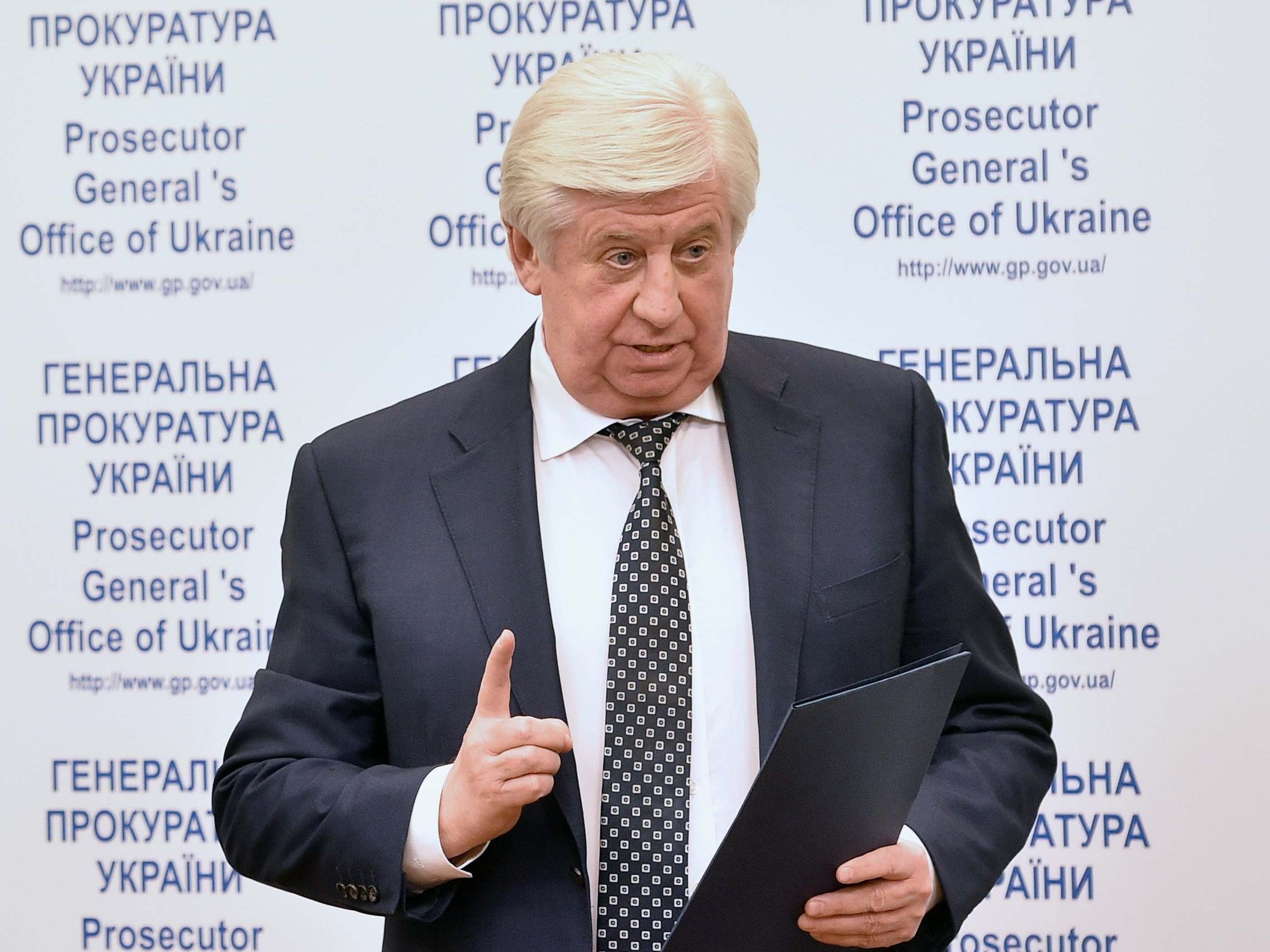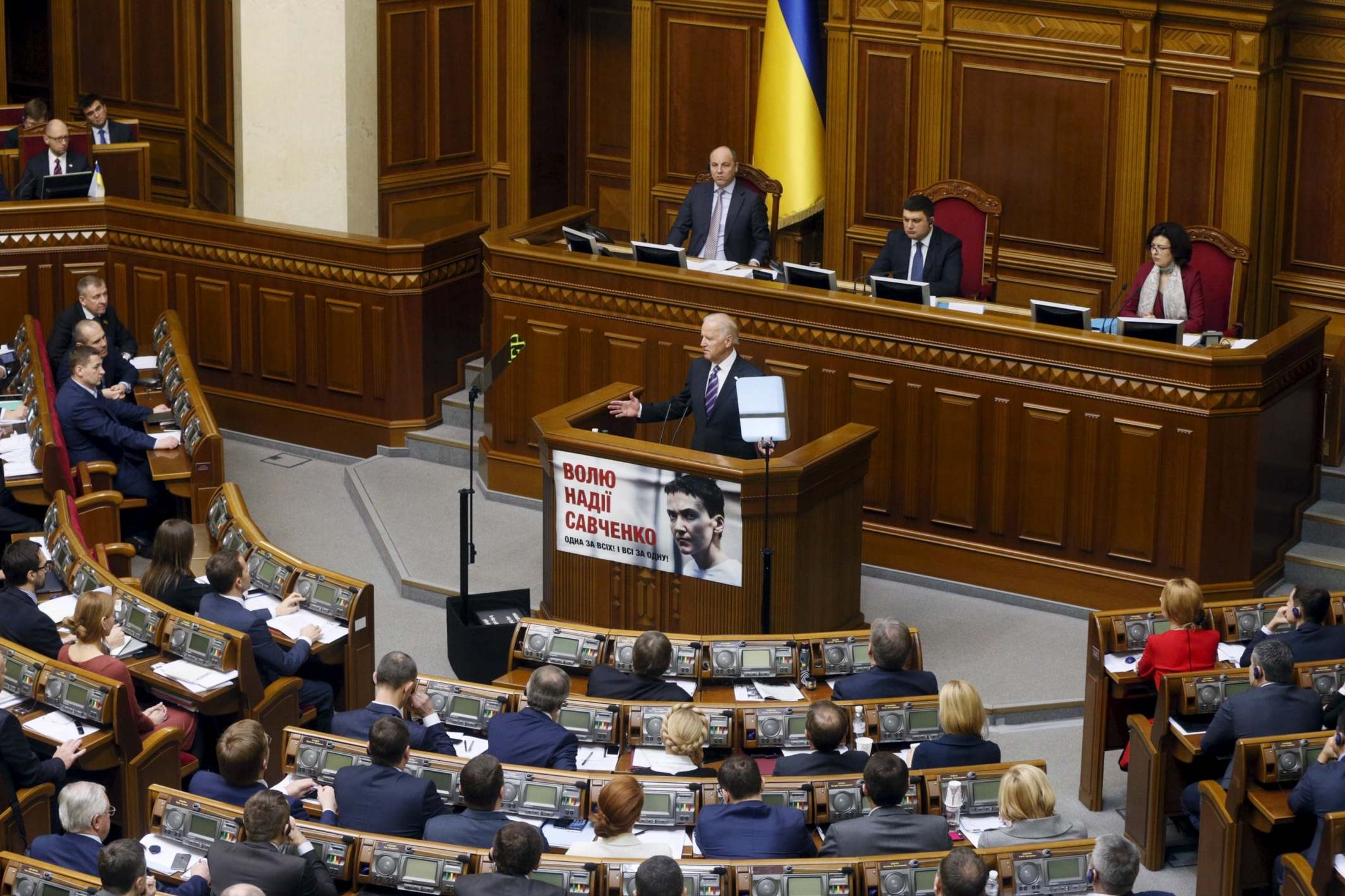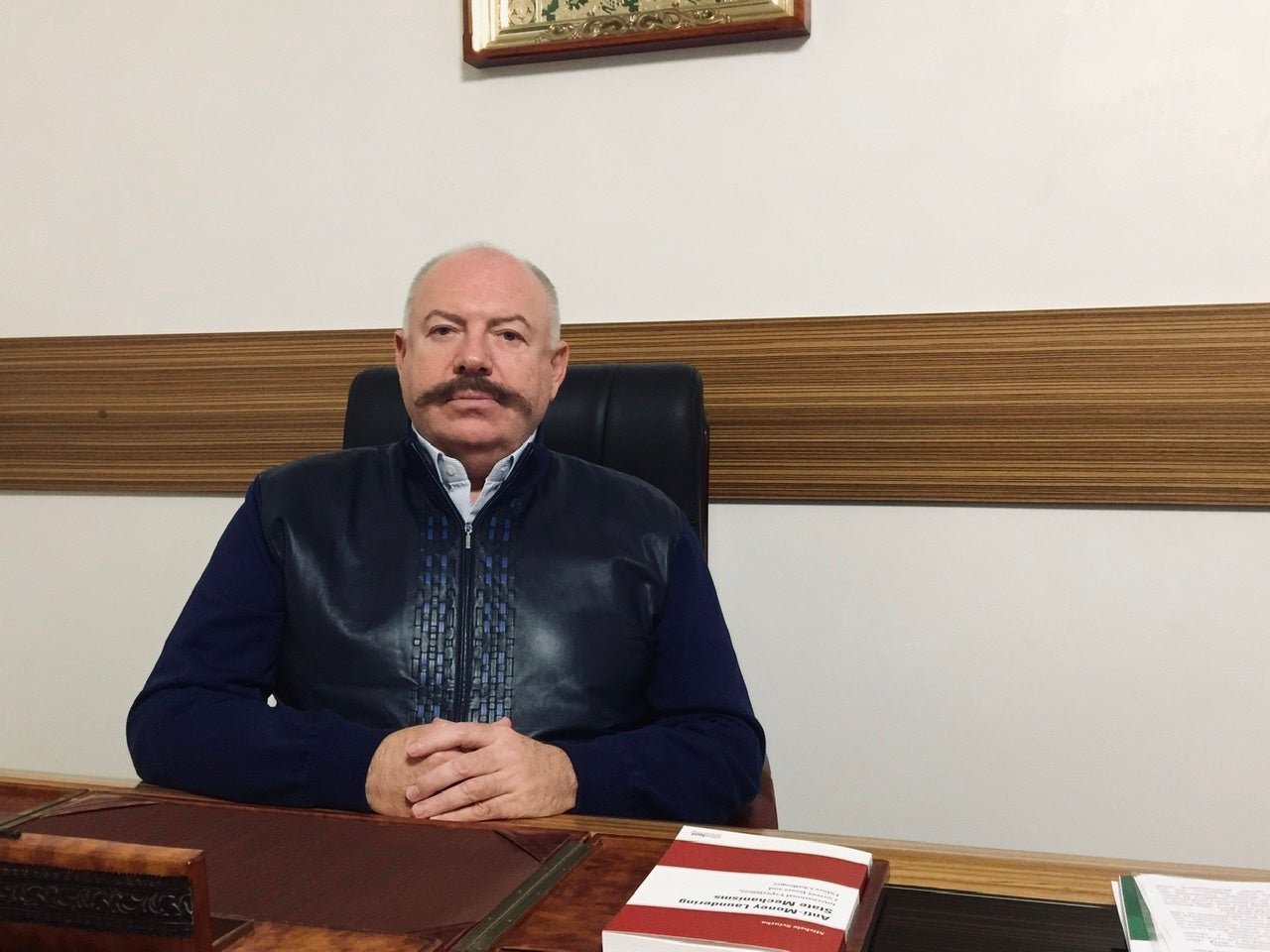Viktor Shokin: The inside story on Ukraine’s ‘very good’ prosecutor at centre of Trump scandal
Donald Trump said Ukraine’s former chief prosecutor was an honest, wronged man, fired after Joe Biden tried to shut down an investigation into his son’s gas company. In Kiev, Oliver Carroll speaks to people who know Viktor Shokin, and finds a different story


David Sakvarelidze was five months into a new job as Ukraine’s reformist deputy chief prosecutor when a witness came forward with intelligence that would change the course of everything.
The witness, a sand producer in the Kiev region, complained of men extorting hundreds of thousands of dollars. It took a while to persuade the man to give evidence. But when he did, and the investigation began, the trail led to two of the country’s highest-placed prosecutors.
A search of the men’s apartments revealed a scene that looked like a comic heist: bags full of cash, diamonds and other precious stones. But that was not the only incriminating evidence. Documents seized at the time indicated the men appeared to have a connection to the top prosecutor in the land, Viktor Shokin.
Police found copies of Shokin’s passports, property registration certificates and even his licence to carry firearms. One of the two men, it transpired, was Shokin’s former driver who had subsequently climbed the ranks behind his boss.
For Sakvarelidze, there were clear suspicions the two men may have been carrying out the business of the chief. But his attempts to investigate were frustrated. Soon, he faced a corruption investigation himself. At loggerheads with Shokin, he was pushed out of his job within the year.
The top prosecutor would also depart in March 2016, at the behest of US vice-president Joe Biden. It was an intervention into local politics that would come back to haunt both Biden and Ukraine.
Shokin’s year atop the prosecutor’s office was for a long time remembered simply as the time of the “diamond prosecutors”.
All that changed with the intervention of Donald Trump. The American president's description of Shokin as “that very good” prosecutor, quoted during his now-infamous 25 July call with President Volodymyr Zelensky, certainly surprised most Ukrainians. For the former prosecutor, it was a chance to rehabilitate himself.
The wild conspiracy theory on which Trump based his assertion – that Joe Biden had Shokin removed to stop him investigating wrongdoing in his son’s gas company – has already been widely debunked.
Put simply, the chronology doesn’t work – the investigation into Burisma, where Hunter worked, was dormant by the time Shokin was pushed out. It would also represent a major historical anomaly. During Shokin’s 13 months in office, not one major figure was convicted. No oligarch. No politician. No ranking bureaucrat. It would appear unlikely he was in the middle of breaking the habit with the Bidens.
But Shokin himself has put his weight behind the complimentary Trumpian narrative.
In an affidavit, submitted in September in an unconnected extradition case involving oligarch Dmytro Firtash, the former prosecutor said he had been dismissed because he refused to heed the advice of then-President Petro Poroshenko to drop an investigation.

“I was forced out because … I was leading a wide-ranging corruption probe into Burisma Holdings, where Hunter Biden was a member of the board,” the statement reads.
Yet the image of Shokin as a crusading, independent prosecutor is inconsistent with the picture given by half a dozen former colleagues interviewed for this piece.
Unanimously, they described Shokin as a “dependent” creature; a man made in the image of whoever was his patron at the time.
In three terms in office, Shokin served three presidents as either deputy prosecutor or chief prosecutor. He made himself useful to all three, the sources say. He made himself especially indispensable to Poroshenko, with whom he has been linked since at least 2001.
“Shokin was quiet, unassuming, and he always fulfilled his orders,” says Oleksandr Martynenko, a prominent Ukrainian journalist who worked as press secretary to Leonid Kuchma, the first president under whom Shokin served.
“Shokin understood the hints, didn’t make scandals, and that’s how he survived and climbed the ladder in the first place.”
Born in Kiev in 1952, Viktor Shokin studied at the Ukrainian Academy of Agriculture, later graduating from the prestigious Kharkiv legal institute. After that followed three decades in the prosecutors’ office.
The first chunk of that career was spent as a lowly investigator. Shokin’s break came in the late 1990s, when he was chosen to head Unit 30, a new division in the Kiev prosecutors’ office devoted to organised crime.
And then, in 2002, came a quite unprecedented leap.
To outsiders, Shokin’s promotion from regional manager to the second most powerful prosecutor in the land looked magical. It was highly unusual for a candidate for one of the top public jobs not to have had significant managerial experience.
To insiders, the story was less mysterious.
In an interview in Kiev, the former chief prosecutor Sviatoslav Piskun, the man responsible for that promotion, revealed he hired Shokin after serious lobbying by Petro Poroshenko. At the time, the future president was a minor oligarch and deputy leader of the Our Ukraine faction in parliament.

“Poroshenko came to me with a clear request and the signatures of a hundred people in his faction,” says Piskun, who headed the prosecutor’s office between 2002-2005. “For the time I have known them, Shokin and Poroshenko were always extremely close. I must admit I never quite got to the bottom of exactly what their relationship was.”
Piskun insists that he never regretted hiring Poroshenko’s man, saying that Shokin showed himself to be a “capable” investigator. He mentioned Shokin’s success getting to the bottom of an investigation of the murders of journalists like Georgy Gongadze, who was found decapitated in woods outside Kiev in 2000. (Gongadze's family say those who ordered the killing were never brought to justice.)
“No one ever investigated as much as we did,” Piskun says. “And I doubt anyone will.”
It is not clear exactly when Shokin’s bond with Poroshenko was first struck. But from the early 2000s, the two men’s careers appeared to grow in tandem.
Following the Orange Revolution in 2004, Poroshenko took control of Ukraine’s national security council. Shokin got a second stint as deputy prosecutor.
In 2014, Poroshenko emerged from the Euromaidan revolution as president. And Shokin, at that point a pensioner, returned to the limelight as deputy prosecutor for the third time, becoming the main man a year later.
“They were together till the end,” says former deputy prosecutor Sakvarelidze. “You can be sure there were financial ties. In Ukraine, it is normal for a major oligarch to find his own prosecutor, his own judges and so on. Shokin was Poroshenko’s special deputy prosecutor. There was no surprise when Poroshenko brought him out of retirement.”
In a rare interview in 2015, Shokin insisted he had not asked Poroshenko for the top job. His former superior Piskun suggests that was not entirely true. “Shokin wanted the job,” the one-time chief prosecutor said, “though he wasn’t aggressive in lobbying for it.”
Lack of aggression was a description many would use for Shokin’s approach to the job in his third spell. Two of the people interviewed for this article described the former chief prosecutor as “lazy”, and uninterested in real investigations. Others noted a penchant for bonding with oligarchs over vodka in the bathhouse.
“He wasn’t exactly highly professional,” said one source, a current Kiev-based prosecutor who asked to remain anonymous. “Shokin would always sign documents without really looking at them. On the other hand, he’d let us get on with our jobs, and was quite democratic, which we all appreciated.”
Another source said Shokin’s tenure as Ukraine’s general prosecutor was “no more, but no less corrupt” than what went before it.
That, of course, was not a ringing endorsement. Since the fall of the USSR, the prosecutor general’s office has come to be considered one of the least trusted public institutions in Ukraine. In Soviet times, abuse of justice was ideological in nature, but the job was largely respected. Around the mid-1990s, corruption began to take over as the main driver. Over time, the institution degenerated into something resembling a legalised racket, sources say.
“When I joined we were doing 80 per cent honest endeavour, and 20 per cent corrupt,” says one prosecutor, who began his career in the late 1990s.
“Now things have switched, and it’s only 20 or 30 per cent honest. The main thing that matters is making the boss happy, and ultimately that means making the president happy. Everything else is for sale.”
The approach of Shokin’s office to the Burisma investigations fell into a well-practiced pattern of corruption, the anonymous prosecutor says. By the time of Biden’s intervention, there were no active investigations to speak of.
“If the idea was to get a result on the Burisma case, Shokin would have put his top people on it,” he says. “That didn’t happen. The aims were different.”
Investigations into Burisma, which only ever covered the period from before Hunter Biden’s involvement in the company, were finally settled in 2016. An audio recording purporting to be of Petro Poroshenko in conversation with another gas tycoon acting as a mediator, offered some clues as to the sequencing. In it, the two men talk about a “global solution” to Burisma’s problems: redirecting cashflows to Poroshenko’s companies.
Poroshenko’s spokespeople have described the recordings as fake, but not everyone is convinced.
“Neither Shokin nor Poroshenko wanted to investigate [Burisma owner Mykola] Zlochevsky,” says Sakvarelidze. “They simply began a criminal case, arrested a few assets, and began negotiating with the corruptioneer for a bribe.”

For activists, Shokin’s prosecutorship is remembered for its failure to secure convictions for crimes of the previous regime. These include the killing of more than 100 protesters during the Euromaidan revolution.
“Shokin impeded those fighting for justice,” said Vitaly Tytych, a lawyer representing the families of the victims. “It is wrong to call what he did investigations. Because if there is one thing Shokin never did it is investigate.”
Serhiy Horbatyuk, who headed the special investigation department which was eventually given responsibility for investigating the Euromaidan crimes, clashed with the leadership of the general prosecutor’s office.
“On Euromaidan, Shokin did not actively impede our investigations,” he says. “But he didn’t help them either. It seemed deliberate.”
By the time Joe Biden arrived in Kiev in December 2015 to issue his infamous ultimatum, Shokin had lost the support of all but 3.5 per cent of Ukrainians.
Many MPs were also clamouring for his dismissal.
First among them was Yehor Soboliev, then a reformist MP of the Samopomich faction and chair of the parliamentary anti-corruption committee. In July 2015, Soboliev pressed for a vote on Shokin’s ousting. The arithmetic was always against him, as the general prosecutor was a figure of the ruling coalition. But he came surprisingly close, collecting 127 signatures from a required 150. Several members of the ruling parties broke ranks to support his move.
“We were under no illusions,” Soboliev tells The Independent. “We saw how Shokin had made an art of dumping cases while pretending to investigate. How he was a symbol of ineffectiveness and stalling. How he was the embodiment of the post-Soviet prosecutor.”
In summing up, David Sakvarelidze used a similar formula.
“Shokin was not a bad man per se,” he says. “He was simply a man of another era; a typical, post-Soviet Ukrainian prosecutor. But after Maidan, that was a certifiable condition.”
Join our commenting forum
Join thought-provoking conversations, follow other Independent readers and see their replies
Comments
Bookmark popover
Removed from bookmarks